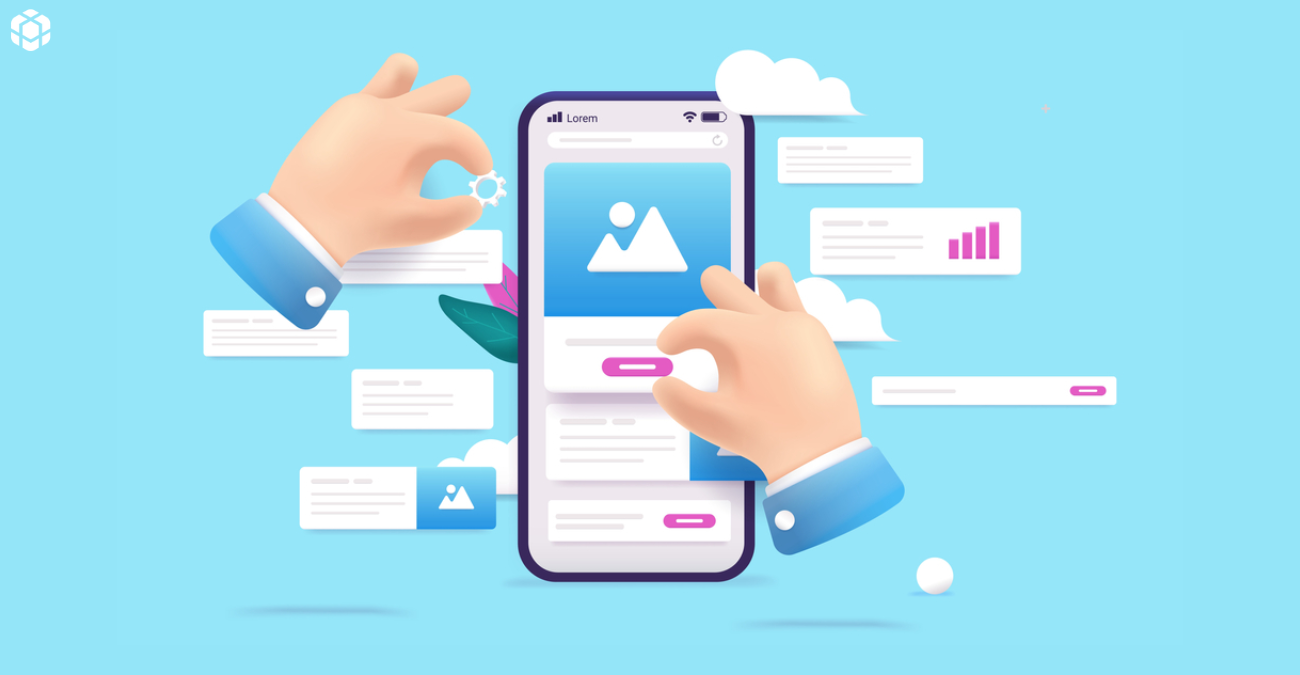
Did you know mobile web browsing makes up nearly 60% of all online traffic? That’s a massive shift, showing how integral mobile apps have become in our daily lives. However, creating an app that stands out and serves users well isn’t a straightforward task.
There are numerous challenges you might encounter while developing a mobile app from truly understanding user requirements, grappling with technical dilemmas, budgeting, and funding to selecting the right platform and effective marketing strategies. But don’t worry; we’ve got your back!
In this guide, we’ll not only discuss these challenges but also offer solutions to each. Ready to tackle app development with confidence? Let’s dive in!
Understanding the Mobile App Development Landscape
Mobile app development involves creating software applications specifically designed to run on mobile devices. These devices come in various forms, including smartphones, tablets, and wearables, each with its unique set of hardware and software capabilities.
Developing mobile apps requires expertise in programming languages and user interface design. You also need to have a deep understanding of the target platform, whether it’s iOS, Android, or both. Remember the time it takes to develop an app varies depending upon the type of app – simple or complex.
Biggest Roadblocks You Might Face In Mobile App Development
While mobile app development can be rewarding, it comes with its fair share of challenges. Below are some of the most common roadblocks developers encounter:
1. Platform Fragmentation
Developing for multiple platforms, such as iOS and Android, can be challenging due to differences in programming languages (Swift/Objective-C for iOS and Java/Kotlin for Android) and design guidelines. Ensuring that your app works seamlessly across various devices and operating system versions requires careful planning and extensive testing.
2. User Interface Design
Crafting an intuitive and visually appealing user interface (UI) is crucial for a mobile app’s success. Balancing aesthetics with functionality, accommodating different screen sizes and resolutions, and ensuring a smooth user experience can be a daunting task.
3. Performance Optimization
Mobile devices have limited processing power and memory compared to desktop computers. Optimising your app’s performance to run smoothly on a wide range of devices is a constant challenge. This includes minimising resource usage, optimising code, and reducing load times.
4. Security
Security is a top concern in mobile app development. Protecting user data, preventing unauthorised access, and safeguarding against potential threats like data breaches or malware attacks require thorough security measures and continuous updates.
5. Compatibility
Ensuring that your app works seamlessly across different versions of operating systems and devices is a continuous challenge. As new devices and OS updates are released, developers must adapt their apps to remain compatible.
6. Connectivity Issues
Mobile apps often rely on internet connectivity, which can be inconsistent and unreliable in some areas. Handling scenarios with poor or interrupted network connections gracefully is essential to provide a good user experience.
7. App Store Approval
Publishing an app on platforms like the Apple App Store and Google Play Store requires adherence to strict guidelines. Ensuring your app complies with these guidelines and getting it approved can be a time-consuming process.
8. Testing and Quality Assurance
Rigorous testing is essential to identify and fix bugs and ensure your app functions as intended. Testing across various devices and OS versions can be time-consuming, and finding and fixing issues can be challenging.
9. Monetization Strategies
Choosing the right monetization strategy for your app, whether it’s through ads, in-app purchases, subscriptions, or a one-time purchase, can be a crucial decision. Finding the balance between generating revenue and providing value to users can be tricky.
10. User Feedback and Updates
Once your app is launched, gathering user feedback and making regular updates to address issues and add new features is an ongoing challenge. Keeping users engaged and satisfied is essential for long-term success.
Overcoming Mobile App Development Challenges
Now that we’ve identified the common challenges in mobile app development, let’s explore strategies to overcome them:
1. Careful Planning
Start with a well-defined project plan that outlines your app’s objectives, target audience, features, and development timeline. A solid plan, along with hiring developers, can help you stay organised and focused throughout the development process.
2. Cross-Platform Development
To address platform fragmentation, consider using cross-platform development tools like React Native, Flutter, or Xamarin. These frameworks allow you to write code once and deploy it on multiple platforms, reducing development time and effort.
3. UI/UX Design
Invest in skilled UI/UX designers who can create a user-friendly and visually appealing interface. You should know about the common UI design mistakes and how to avoid them. Also, conduct user testing to gather feedback and make iterative improvements to the design.
4. Performance Optimization
Continuously monitor and optimise your app’s performance. Use profiling tools to identify bottlenecks and resource-intensive code, and make necessary improvements.
5. Security Measures
Implement robust security measures, such as data encryption, user authentication, and secure coding practices. Regularly update your app to patch security vulnerabilities.
6. Compatibility Testing
Maintain a device and OS version matrix for testing purposes, and regularly update it to cover the latest hardware and software releases. Automated testing tools can help streamline compatibility testing.
7. Offline Functionality
Build offline functionality into your app when possible. Cache data locally, provide offline access to essential features, and offer clear user feedback when the internet connection is lost.
8. App Store Submission
Familiarise yourself with the guidelines of the app stores you’re targeting. Test your app thoroughly to ensure it meets these guidelines before submitting it for approval. Be prepared to address any feedback from app store reviewers promptly.
9. Quality Assurance
Invest in a comprehensive quality assurance process, including manual and automated testing. Conduct testing on real devices to catch platform-specific issues early.
10. Monetization Strategy
Choose a monetization strategy that aligns with your app’s purpose and target audience. Consider offering a free version with ads or in-app purchases, and gather user feedback to refine your strategy over time.
Conclusion
Mobile app development is a dynamic and rewarding field, but it comes with its fair share of challenges. From platform fragmentation to security concerns and the ever-evolving app store guidelines, developers must navigate a complex landscape to deliver successful apps.
However, armed with careful planning, the right tools, and a commitment to quality and user satisfaction, you can overcome these challenges. Cross-platform development frameworks, robust security measures, and well-thought-out monetization strategies can all contribute to app success.
Codesy Consulting is the best when it comes to efficient Mobile app development. We perfectly understand that Mobile app development is not just about creating an app but also about nurturing it over time to ensure its continued relevance and usefulness. So get in touch and have your app ready without facing any roadblocks.
FAQs
Q1. What is the biggest challenge in mobile app development?
A1. Platform fragmentation is often considered the biggest challenge, as developers must ensure their apps work seamlessly across various devices and operating systems.
Q2. How can I ensure my app is secure?
A2. Implement security measures such as data encryption, secure coding practices, and regular updates to patch vulnerabilities.
Q3. What is the best way to monetize a mobile app?
A3. The best monetization strategy depends on your app’s purpose and audience. Consider options like ads, in-app purchases, subscriptions, or one-time purchases.
Q4. How can I stay updated with the latest mobile app development trends?
A4. Stay informed by following industry blogs, attending conferences, and joining online communities of mobile app developers. Continuous learning is key.
Q5. What should I do if my app is not getting approved on app stores?
A5. Carefully review the app store guidelines and address any issues or concerns raised by the app store reviewers. Be prepared to make necessary changes and resubmit.





